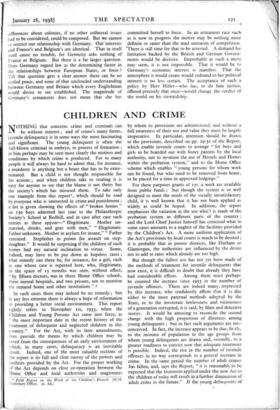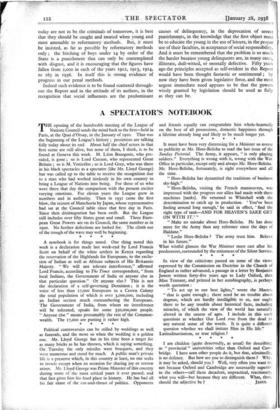CHILDREN AND CRIME
NOTHING that concerns crime and criminals can be without interest ; and of crime's many forms, juvenile: delinquency is in some ways the most fascinating and significant. The young delinquent is often the full-blown criminal in embryo, in process of formation ; in him perhaps may be seen most clearly the motives and conditions by which crime is produced. For to many people it will always be hard to admit that, for instance, a murderer is anything but a brute that has to be exter- minated. But a child is not thought responsible for his actions ; and when children take to stealing it is easy for anyone to see that the blame is not theirs but the society's which has misused them. To take only one example from this report*, which should be read by everyone who is interested in crime and punishment ; a list is given showing the effects of " broken homes " on 15o boys admitted last year to the Philanthropic Society's School at Redhill, and in case after case such entries as these appear—" Illegitimate. Mother un- married, drinks, and goes with men," " Illegitimate. Father unknown. Mother in asylum for insane," " Father executed. Stepfather in prison for assault on step- daughter." It would be surprising if the children of such homes had any natural inclination to virtue. Some, indeed, may have to be put down as hopeless cases ; what remedy can there be, for instance, for a girl, such as one whose case is reported here, who, illegitimate, in the space of .15 months was seen, without effect, " by fifteen doctors, was in three Home Office schools, three mental hospitals, and two prisons, not to mention the remand home and other institutions " ?
In such cases there may indeed be no remedy ; but in any less extreme there is always a hope of reformation in providing a better social environment. This report rightly refers to November 1st, 1933, when the Children and Young Persons Act came into force, as " the most important date in the recent history of the treatment of delinquent and neglected children in this country." For the Act, with its, later amendments, does provide the means by which children may be saved from the consequences of an early environment of which, in many cases, delinquency is an inevitable result. Indeed, one of the most valuable sections of the report is its full and clear survey of the powers and facilities provided by the Act. For the proper working of the Act depends on close co-operation between the Home Office and local authorities and magistrates • Fifth Report on the Work of the Children's Branch. (H.M. Stationery Office. 2s. 6d.) by whom its provisions arc administered, and without a full awareness of their use and value they must be largely inoperative. In particular, attention should be drawn to the provisions, described on pp. 29-31 of the Report, which enable juvenile courts to arrange " for boys and girls to be boarded out with foster parents by the local authority, not to mention the use of Hostels and Homes within the probation system," and to the Home Office scheme which enables " young persons for whom work can be found, but who need to be removed from home, to be placed for a time in approved lodgings."
For these purposes grants of 15s. a week are available from public funds ; but though the system is so well designed to meet the needs of the socially unsatisfactory child, it is well known that it has not been applied as widely as could be hoped. In addition, the report emphasises the variation in the use whiet is made of the probation system in different parts of the country ; and the Lord Chief Justice himself has criticised what in some cases amounts to a neglect of the facilities provided by the Children's Act. A more uniform application of the Act's provisions by local courts is much to be desired ; it is probable that in poorer districts, like Durham or Glamorgan, the authorities are influenced by the desire not to add to rates which already are too high.
But though the fullest use has not yet been made of the methods of treatment for juvenile delinquents that now exist, it is difficult to doubt that already they have had considerable effects. Among them must perhaps be counted the increase since 1933 in the number. of juvenile offences. There are indeed many, impressed by this increase, who confidently affirm that it is due either to the more paternal methods adopted by the State, or to the inveterate lawlessness and viciousness of a generation corrupted, it is said, by films and detective stories. It would be amusing to reconcile the second charge with the high proportion of illiterates among young delinquents ; but in fact such arguments are mis- conceived. In faCt, the increase appears to be due, firstly, to the increase of population in the age groups from whom young delinquents are drawn and, secondly, to a greater readiness to convict now that adequate treatment is possible. Indeed, the rise in the number of juvenile offences in no way corresponds to a general increase in crime. In the same period the number of adult crimes has fallen, and, says the Report, " it is reasonably to be expected that the treatment applied under the new Act to the children of today will result in a further diminution of adult chine in the future." If the young delinquents of today are not to be the criminals of tomorrow, it is best that they should be caught and treated when young and most amenable to reformatory methods. But, it must be insisted, as far as possible by reformatory methods only ; the birching of boys under 14 by order of the State is a punishment that can only be contemplated with disgust, and it is encouraging that the figures have fallen from 2,000 in each of the years 1912, 1913, 1914, to 165 in 1936. In itself this is strong evidence of progress in our penal methods.
Indeed such evidence is to be found scattered through- out the Report and in the attitude of its authors, in the recognition that social influences are the predominant causes of delinquency, in the deprecation of severe punishments, in the knowledge that the first object must be to eduCate the young in the use of leisure, in the proper use of their faculties, in acceptance of social responsibility'. And it must be remembered that the problem is so much the harder because young delinquents are, in many cases, illiterate, dull-witted, or mentally defective. Fifty years ago the principles accepted as self-evident in this Report would have been thought fantastic or sentimental ; by now they have been given legislative force, and the most urgent immediate need appears to be that the powers wisely granted by legislation should be used as fully as they can be.



















































 Previous page
Previous page